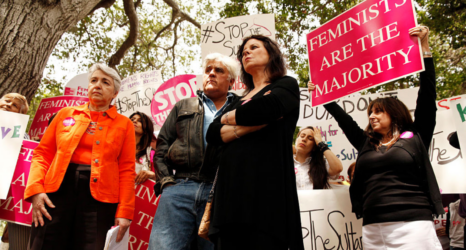As we saw with 2011’s targeted regulation of abortion providers (TRAP) bill, the Republican-dominated Pennsylvania legislature routinely ignores protests from medical associations and professionals in passing bad-faith bills that politicize and endanger women’s health.
Now, Republican Gov. Tom Corbett, already suffering low approval ratings in large part because of a significant gender gap, is poised to sign HB 818. The bill intrudes on the free market by prohibiting private insurance companies that plan to sell health-care plans through Pennsylvania’s forthcoming state health insurance exchange from covering abortion, even in cases of medical emergency, health of the mother and severe fetal anomaly.
Even more troubling, lawmakers supporting HB 818 are attempting to deceive the public by offering a non-solution: allowing Pennsylvania women to purchase abortion-specific riders from private companies not participating in the exchange.
The problem is that such abortion riders do not appear to exist.
Even though the state exchange, established by the Affordable Care Act (ACA), won’t be set up until next year, Pennsylvania lawmakers have been working on versions of the bill since Corbett’s first week in office back in 2011.
The bill’s sponsor, state Rep. Donna Oberlander (R), insists HB 818 simply underscores existing policy that already prohibits tax dollars from funding abortion. There’s no reason for the “small government” party to propose redundant legislation—except, of course, as cover for something else.
HB 818 doesn’t address tax dollars, which are indeed not allowed to be used to fund abortions (except in cases of rape, incest and endangerment to the life of the mother) under the Hyde Amendment, Pennsylvania state law and terms set within the ACA. What it will do is require businesses participating in the health-care exchange to offer sub-standard insurance plans to women—which, in turn, means the hundreds of thousands of Pennsylvania women expected to purchase coverage through the exchange won’t be able to spend their own money to purchase industry-standard medical care through the exchange.
Tinkering with the free market in order to bully insurance companies into economically hijacking working women’s constitutional right to abort an unwanted pregnancy is bad enough, but HB 818 goes even further, restricting physician-advised terminations of wanted pregnancies complicated by unexpected disease or accident.
Pennsylvania lawmakers explicitly rejected an amendment to add health of the woman as an exception to the narrow restrictions, which only allow abortion coverage “where necessary to avert the death of the woman” and in cases of incest and rape, providing the rape victim already reported the assault to the authorities. (The fact that many victims often don’t report aside, protocol of communication between police, insurers, doctors and patients is unclear.)
When lawmakers voted against a medical emergency amendment offered by state Sen. Judy Schwank (D), they voted against insurers covering the expense of medically advised terminations in cases when a pregnant woman faces, for example, a cancer diagnosis, diabetes, a car accident or discovers a severe fetal anomaly.
“Let’s say a woman was pregnant [and] her water broke prematurely and the baby would not survive. She would not be able to get an abortion,” said Sen. Schwank. At least, not without paying out-of-pocket for the procedure, which could cost tens of thousands of dollars.
“These are already tragic situations,” said Schwank. “These are babies that are wanted, and to have to add this anguish on to the situation. … I can’t understand why we couldn’t get this through.”
“Certainly I understand that there are extenuating circumstances,” Oberlander said in a PCN interview defending the bill. “However, [a health exception is a] loophole wide enough you can ride a semi truck through. Women experience a lot of different issues and side effects from a pregnancy.”
Seemingly frustrated with questions about the bill, Oberlander added, “It’s not rocket science.” Well, it’s not medical science, either; it’s religion-based health care influenced by special interests. Specifically, the Pennsylvania Catholic Conference, the public affairs arm of Pennsylvania’s Catholic bishops, and the Catholic dioceses of Pennsylvania lobbied hard for HB 818 and against the health amendment.
Rep. Oberlander insists the bill is “consistent with the will of the people.” But 2011 polling conducted by Susquehanna Polling & Research reveals otherwise. When asked whether or not they support insurance companies participating in the exchange covering abortion “to protect the health of the woman,” 79 percent of respondents said yes.
With HB 818, Pennsylvania is trying to legislate the gender discrimination that the ACA was drafted in part to eradicate back into state law. Pennsylvania, after all, is one of the 37 states that currently allows gender rating—which means charging women more than men for identical coverage.
Excerpted and reprinted from RH Reality Check. Read the original piece here.
Photo of Gov. Corbett courtesy of PANationalGuard via Creative Commons 2.0.





